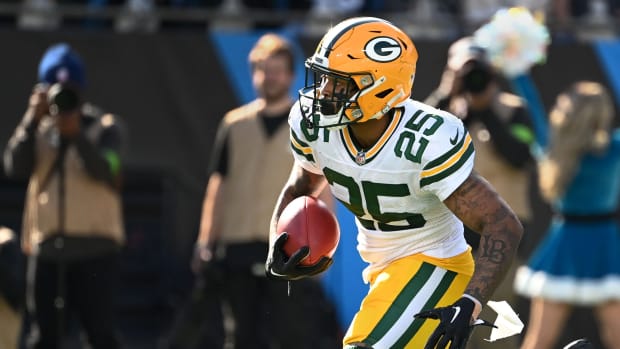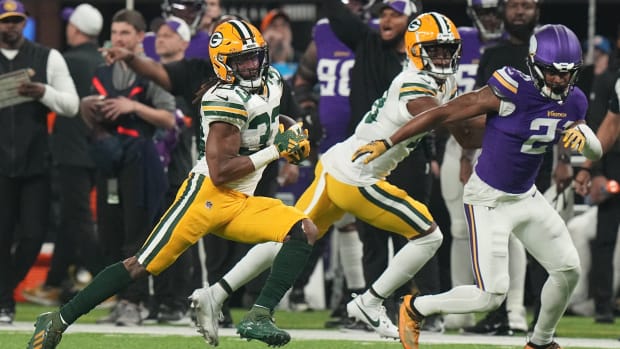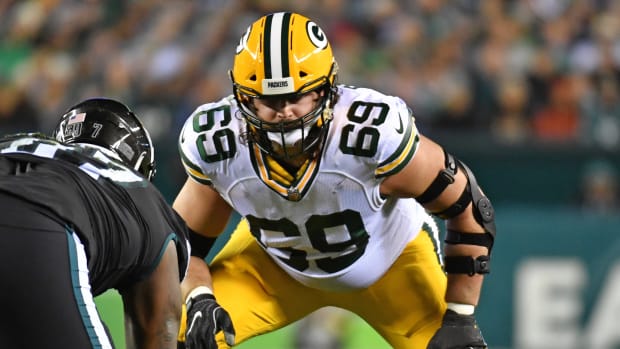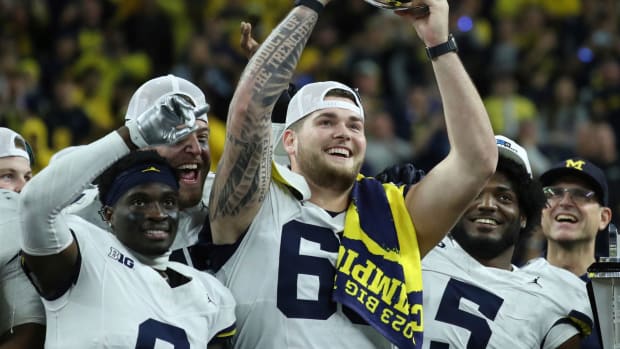Packers Positions of Need: Top 10 Tight Ends
It might not be as obvious as inside linebacker or receiver, but the Green Bay Packers have a need at tight end. Jimmy Graham could be a salary-cap casualty, fellow veteran Marcedes Lewis is headed to free agency and the jury is out on Jace Sternberger and Robert Tonyan. With that, here is our early look at the top 10 prospects at the position. (Underclassmen are noted with an asterisk.)
Cole Kmet, Notre Dame (6-5, 250)*: Kmet is the latest in a long line of Notre Dame tight ends headed to the NFL. He’s something of a one-year wonder with a junior season of 43 receptions for 515 yards and six touchdowns. He started his season off with a bang with nine catches for 108 yards and one touchdown vs. Georgia – an incredible feat after he returned sooner than expected from a broken collarbone – and he followed that with a four-game touchdown streak. According to Pro Football Focus, he dropped two passes the last two seasons.
He pitched on the baseball team for two seasons. As a sophomore in 2019, he had 27 strikeouts vs. three walks in 18.2 innings before being shut down with a sore elbow. Kmet’s dad, Frank Kmet, was a fourth-round pick by the Buffalo Bills in 1992. An uncle, Jeff Zgonina, played on the defensive line for 17 NFL seasons. He almost gave up football before high school. His shoes are size 16.5 and he has a 40-inch vertical. “Cole can do so many different things,” quarterback Ian Book says. “He’s got crazy skills to catch the ball, run block, pass block.” Kmet was a triple threat in football, baseball and academics. “It’s always been a dream of mine,” Kmet said of playing both sports at the collegiate level. “I never wanted to quit one or the other. I noticed this is the best place for it, seeing other guys have done it in the past … I like being in-season a lot.
Brycen Hopkins, Purdue (6-5, 245): A full-time starter for the first time as a senior, Hopkins earned some All-American honors and was voted the Big Ten’s Kwalick-Clark Tight End of the Year. He recorded 61 receptions for 830 yards and seven touchdowns. His reception and yardage totals were the most by a Boilermakers tight end since Dustin Keller had 68 receptions for 881 yards in 2007. “He’s been a playmaker for us,” said quarterbacks coach Brian Brohm, a former Packers draft pick. “He can go get the ball as a great receiving tight end, he can block as well. But we need to get him the ball a couple times each quarter, just to get him in space and let him do some things with his athletic ability because he’s a big-time player.”
Hopkins only played football for two years in high school. It was basketball, however, that got him noticed by recruiters. “He drove the baseline and just ripped the rim off the hinges, almost. I was like, there you go,” former Purdue recruiting coordinator Gerad Parker said. His father, Brad, played football at Illinois and for the Tennessee Titans. “It’s something that I’ve dealt with for a while, and I’d say it’s made me who I am today,” Hopkins said of the football genes. “I say, ‘Any pressure you have, bring it on. I enjoy it.’” According to PFF, he provided a bunch of big plays but dropped too many passes and offered little after the catch.
Adam Trautman, Dayton (6-6, 253): Trautman earned FCS All-American and was a finalist for the Walter Payton Player of the Year Award as the top offensive player in FCS following a dominant senior season. He finished his Dayton career with the school record for receptions in a season (70), touchdowns catches in a season (14), career receptions (178) and career touchdown catches (31). He was the top-rated tight end in FCS in receiving touchdowns (14), receptions (6.4 per game), receiving yards (916) and scoring (7.8 points per game).
He answered questions about competition with a strong week at the Senior Bowl. “I’m here to prove I’m the best senior tight end in the entire country and that I belong here and that asterisk next to my name – that LLC for lower-level competition – doesn’t mean anything. I’ve been waiting for this ever since I got the invite. It’s something I’ve been looking forward to. I know how big a piece this is of my evaluation as an NFL prospect. I’m super excited for this opportunity and couldn’t be more thankful.” He arrived on campus as a quarterback following a record-setting career in Traverse City, Mich. “We thought Adam would make a good tight end when we looked at his high school films,” head coach Rick Chamberlin said. “He had a big body that is athletic and had soft hands, and a guy who could have mismatches with linebackers or safeties.” Chamberlain called Trautman his “unicorn” as a football star for a program that hasn’t sent anyone to the NFL in almost 45 years.
Hunter Bryant, Washington (6-2, 239)*: Bryant earned some All-American honors after catching 52 passes for 825 yards and three touchdowns. He had a three-season haul of 85 receptions for 1,394 yards, numbers that ranked second and fourth all-time among Washington tight ends. According to PFF, his 2.90 yards per pass route is tops among tight ends over the last six draft classes.
Bryant missed 13 games due to knee injuries his first two seasons. After missing most of the 2018 season, he came back and had a monster Apple Cup vs. Washington State and a memorable one-handed catch vs. Ohio State in the Rose Bowl. “I just thought it was a regular catch. Going all through high school, I loved catching with one hand ever since Odell (Beckham) did his thing and that went viral. I remember going out to practice in high school and just catching everything with one hand. So, when I made that play, it was just a regular play to me. Everyone was hyped on the sideline, but I was so focused on the game I didn’t even realize it until after.”
Bryant has been critiquing his own play since he was 5. Looking back at the player he was as a freshman, he said: “In 2017, he was just raw. I feel like he was just a raw athlete who just loved making plays when the ball was in the air. Now I’m just a lot more calm and relaxed and I can really read defenses more, read defenders. DBs that are covering me, I can read what they’re going to do and kind of react off of them. I’m a lot smarter now.” He grew up playing running back.
Harrison Bryant, Florida Atlantic (6-5, 242): Bryant won the Mackey Award as the nation’s top tight end after a monster season of 65 receptions for 1,004 yards and seven touchdowns. He started his season with six catches for 79 yards vs. powerhouse Ohio State, and six of his touchdowns came in the final four games. Bryant is the first player in the 19-year history of the football program to receive a national individual accolade, and he became the first non-Power Five player to receive the Mackey Award in the award’s 20-year history. In his final three seasons, he caught 142 passes and scored 16 touchdowns.
Originally, Bryant was headed to Samford as a defensive end after posting 11 sacks during his senior year at John Milledge Academy in Macon, Ga. He was an all-state offensive tackle as a junior and an all-state tight end and defensive end as a senior. He chose Samford as a 210-pound, zero-star defensive end. “Once I committed to FAU I got two stars,” Bryant recalled at the Senior Bowl. He had a 3.65 GPA. “I think at the beginning of the season [running backs coach Kevin] Smith used to say to [tight ends coach Clint] Trickett and I to drive him to the Mackey,” offensive coordinator Charlie Weis said. “He drove himself to the Mackey. He did it. When you’ve got a phenomenal player like him or like we had (Devin Singletary) the year before, that’s just the guy you’ve got to get the ball as much as you can and be creative and do different things. That’s what we did with him this season.”
Jared Pinkney, Vanderbilt (6-4, 260): Pinkney caught 20 passes for 233 yards and two touchdowns as a senior. He was much more productive with Drew Lock slinging the rock as a junior, when he hauled in 50 passes for 774 yards – the third-most receiving yards among tight ends – and seven scores to earn second-team all-SEC. At his size, he’s more in the old-school than new-school mode.
He pondered turning pro at that point, having been told by the NFL he could be a second-round pick, but elected to return for his senior year. “When I see the degree and then I see the opportunities I’m going to have in football, for me to have done that at the same time, I feel like that’s a huge accomplishment,” he said. Coach Derek Mason called Pinkney an “old soul.” Pinkney agreed: “I don’t party, I don’t drink, I don’t do drugs. I barely go out on the town. It’s always been about football.” That means watching a lot of Zach Ertz and Travis Kelce.
Thaddeus Moss, LSU (6-3, 249)*: Moss is the son of Pro Football Hall of Fame receiver Randy Moss. It was Thaddeus who put the Hall of Fame gold jacket on his father during the induction ceremony. “My father didn’t pressure me when I was growing that I had to play football. If I wanted to be an engineer, I’d be an engineer and he’d be 100 percent behind me. I fell in love with football at an early age, because I loved the physicality of it. But I’ve never felt any pressure to carry the (Moss) name on.”
He is coming off the best statistical season ever for an LSU tight end with 42 receptions for 534 yards. He had a 62-yard touchdown in the playoff win vs. Oklahoma and also scored a touchdown in the championship game vs. Clemson. Moss spent only one season at LSU, having started his career at North Carolina State. He sat out the 2017 season due to NCAA transfer rules and the 2018 season due to foot injuries. In 2016, he caught six passes at NC State. “It was tough,” he said of sitting out 2018. “I didn’t really know what to do with myself. I didn’t really know how to react. I didn’t really know how to look at anything. Looking back at last year, (it) was almost like a fog.” He surprisingly won the starting job during fall camp. “Thaddeus is a great receiver. You’re going to see a lot out of him,” quarterback Joe Burrow said before the season. Almost incredibly, Moss spent time at five high schools. The injuries and the moving all paid off with a national championship. “What I love about him as a coach, as a competitor, is his physical toughness — his willingness to block,” Clemson defensive coordinator Brent Venables said before the national championship game. “He’s got some real dirtbag to him, which is a great compliment. Very tough-minded. He’s willing to get his nose bloody. He wants to hurt people. He’s attacking people with purpose.”
Colby Parkinson, Stanford (6-7, 251)*: After a breakout sophomore season in which he caught seven touchdown passes, Parkinson grabbed 48 passes for 589 yards and one touchdown in 2019 to earn second-team all-Pac 12. In a game against Oregon State, he caught one touchdown pass and threw another.
In 2018, he tied a school record with four touchdown catches against Oregon State. He did it with a heavy heart, with the big game coming in the wake of a mass shooting and wildfires near his hometown of Simi Valley, Calif. “It’s hit me pretty hard with the shooting back home — down the street from my high school — and then the wildfires coming up the next day,” Parkinson said. “That’s been pretty heavy on my heart recently. I always pray before the game and at halftime. That was the only thing that was on my mind (Saturday night), not even football. It’s bigger than that.” He scored the game-winning touchdown vs. Oregon in 2018 with a tip-drill catch. His size is an obvious advantage. “What I’ve learned is to use my size. I’ve gone up against a number of great athletes at these camps and I realize that my size is an advantage. I had some pretty good success and my confidence has gone through the roof. I’ve really tried to be aggressive in my approach and in attacking defenders.”
Jacob Breeland, Oregon (6-5, 250): Breeland set career highs with 26 receptions for 405 yards and six touchdowns despite playing only six games as a senior because of a season-ending knee injury. He thrived with top quarterback Justin Herbert slinging passes and several passing-game weapons out with injuries. “When you’ve got an NFL quarterback playing as your quarterback, it’s pretty nice. I just run up the hash, honestly, and he throws a perfect ball every time. I just catch it and run.”
On 74 career catches, he averaged a robust 16.6 yards per catch. “We’re looking at a guy that has legitimate speed, that can stretch the field ... he presents some issues for our opponents,” coach Mario Cristobal said. “Jake’s become a really good blocker as well. I know he takes a lot of pride in that. When you keep a guy like that on the field, you could have him as part of the core, you can detach him and put him on the perimeter, as well as a receiver or as a blocker. Now your flexibility as an offense continues to expand.
Breeland’s father, Garrett, started at linebacker at USC and was drafted by the Rams in 1986. A week after Jacob Breeland signed with Oregon, Garrett Breeland died of a heart attack. “It was tough because I didn’t get to process it like I wanted because I had to do football and school, so I didn’t have time. … Sometimes I would want to call him and tell him I had a bad day at practice and ask what I should do, ask him for advice because he has been through it,” Breeland said. “It is hard when you can’t do that, but I have good friends and my mom and they help me out tremendously. I’ve got a lot of people on my side.”
Albert Okwuegbunam, Missouri (6-5, 255)*: Okwuegbunam had a relatively ho-hum final season with 26 catches for 306 yards and six touchdowns, his year derailed by a knee sprain that kept him to nine games. He had five touchdowns in a four-game span early in the season. As a sophomore, he was a finalist for the Mackey Award, which goes to the nation’s top tight end, after recording 43 catches for 466 yards and six touchdowns despite being limited to nine games by a broken scapula. He scored 11 touchdowns as a redshirt freshman. In three seasons, he caught 98 passes for 1,187 yards and 23 touchdowns.
His full name is Albert Chukwueneka Okwuegbunam. The Nigerian translation of Okwuegbunam means “Evil cannot bring us down” while his middle name means “God has done wonderful for us.” His father, Albert Sr., immigrated to Springfield, Ill., from Nigeria when he was a teenager. He was a soccer goalie at Lincoln Land Community College who reluctantly agreed to let his son play the rough-and-tumble sport of football. “(I want Albert Jr. to) be a good person, be a good man,” Albert Sr. said. “Be able to succeed academic-wise and in football, what he loves to do. That’s all you can ask for your son.” Okwuegbunam’s tenacity stood out to his father as his young son learned how to walk. That tenacity came from his father, who worked three jobs to get through college. “Whenever I need to dig deep or I need some motivation, I always think about my dad,” the younger Okwuegbunam said. “Nothing in the world makes him happier than when I’m successful. I do it not only for myself, not only for my teammates, but also my dad. He worked really hard. Came from basically nothing.”
RELATED
Top 10 offensive tackle prospects





